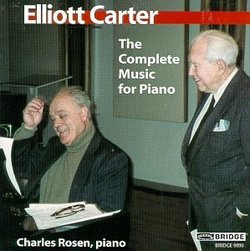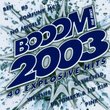| All Artists: Elliott Carter, Spoken Word, Charles Rosen Title: Elliott Carter: The Complete music for Piano Members Wishing: 1 Total Copies: 0 Label: Bridge Release Date: 11/18/1997 Genres: Special Interest, Classical Styles: Chamber Music, Forms & Genres, Fantasies, Sonatas, Historical Periods, Classical (c.1770-1830), Modern, 20th, & 21st Century Number of Discs: 1 SwapaCD Credits: 1 UPCs: 090404909023, 090404909023 |
Search - Elliott Carter, Spoken Word, Charles Rosen :: Elliott Carter: The Complete music for Piano
 | Elliott Carter, Spoken Word, Charles Rosen Elliott Carter: The Complete music for Piano Genres: Special Interest, Classical Opening with a fleshy, resonant version of "90+," which was nominated for a 1998 Grammy award, this Carter collection is special not only for Charles Rosen's execution but also for the CD-closing conversation between perfo... more » |
Larger Image |
CD DetailsSynopsis
Amazon.com Opening with a fleshy, resonant version of "90+," which was nominated for a 1998 Grammy award, this Carter collection is special not only for Charles Rosen's execution but also for the CD-closing conversation between performer and composer. Rosen opens the chat with a demonstration of how harmonic dissonance at once backlights and highlights Carter's famed rhythmic explorations. And Carter tells him, "This is the way we experience many things, the idea that one thing comments on another constantly." That's how Carter's music is, also constantly: frontal harmonic shocks, whether ringing tremulously or jumping in bursts of flash--as in Rosen's read of the Piano Sonata--are in dialogue with silence, rhythmic twists, and plainly beautiful constructions that sound in-process. The addition of "90+" and Bridge's customary rounded, warm sonic spaciousness make this collection superior to Rosen's Etcetera Carter collection. And for a more restrained, abstract look at "90+," try Ursula Oppens's version. --Andrew Bartlett Similar CDs
|
CD ReviewsFine playing of three piano masterworks scarecrow | Chicago, Illinois United States | 04/21/2000 (5 out of 5 stars) "Almost every CD of new works should feature a conversation with the composer. There never was a time when this wasn't necessary. Rosen is a great question-asker, and Carter creates a context for us out here with reflections from the history of music. And such gems as Carter's interest in jazz is discussed, the freedom from the tyranny of the barline,improvisation and his interests in early Renaissance music where again the pulse of a regularly recurring downbeat was blurred.I don't see any jazz in Carter,but then he does say that music today is not modern enough,I thought was a good perspective. But all this piano music can be encountered with these simple ideas in mind. The Piano Sonata was Carter's first success, and this piece reflects the times,perhaps like a dialogue amongst composers, something that is still part of this scene today.The lyrical with tonality leftovers is here you may hear Aaron Copland(however only in its surface features.No Carter was finding his own voice and this is a sprawling romantic gesturing piece with flights of virtuosity. The Six-Eighth feel is utilized to escape the severe roaring lower register octave moments,which begins the piece,much like the Brahms F minor Sonata, in fact the first movement is like a dialogue between the sustained piano sound and the arpeggiated chord.Carter was not afraid of overtaxing the extreme higher registers as well,where the moments almost turn etude-like. The second movement with its open lyrical sonorities may remind you of the Copland Sonata especially the way it resolves itself with the presto metric changes in break neck finale. Night Fantasies was a quadruple dedication;Ursula Oppens, Gilbert Kalish,Paul Jacobs and Charles Rosen,all marvelous pianists who have made their careers exclusivily with new academic bound music. The nocturnal concept of the Night was a means of invoking the cross again between the sustained sound and the arpeggiated, and Carter's music always works best with a programmatic element at work to guide his opaque sonoric abstractions.But Carter's structural plan is much more complex than that, at least from the confines of his writing desk. There are many piano textures at work here,some 12 different piano sonorities,broken chords,register displacements,internal changes of single tones,staccato with sustained tones,single tones interrupting a sustained tone, and always with a penchant for interrupting each others moments regarless of where tones are situated on the piano, like a fantasia with an all interval 88 chord scheme as a structural base. There is great analytical diversity here seemingly endless to discuss, that I suspect will keep the scholarly lights burning on the Commons. But simply listening to the work does evoke and suggest this sense of the fantasia noctural with simple sustained single tones very separated so we hear them clearly. 90+ is shorter work equally brilliant sounding,but more reserved almost introspective but not any less structurally vigorous.It is based on 90 staccato tones utilized again as points of interruptions. What this approach does is propell the work forward, similar to light, gentle lighting or electric charges cattle-prodding the durational frame.This keeps the work moving where nothing ever really lands anywhere with rhythmic security until the final pages of the work. Rosen is a Carter pianist and understands his music very well and brings a clarity and goal oriented conviction to his playing,always featuring the surface aspects of this music, the roaring piano sound,allowing the full weight of the sonority to be heard,but controlled and balanced.Rosen's penchant for Romantic piano literature also helps infuse his playing of Carter with this conceptual emotive base the music needs, for Carter is a thoroughly modernist romantic." Lively atonal music dig-it-the-most | New York | 07/08/2002 (5 out of 5 stars) "This is not dry academic music but exciting music, performed by Charles Rosen with energy and surprises. It is great to hear Mr Carter's interview on the last track, talking about music. Here is the Man!" Excellent recording of a modern classic William Mealiffe | Richmond, CA United States | 09/03/2004 (5 out of 5 stars) "Having loved the Carter Piano Sonata since first hearing it years ago, and on learning that the really fine pianist (and equally accomplished music scholar) Charles Rosen had made a
recent recording of it, I picked it up right away. And I was not disappointed. This is an excellent performance of a modern classic." |


